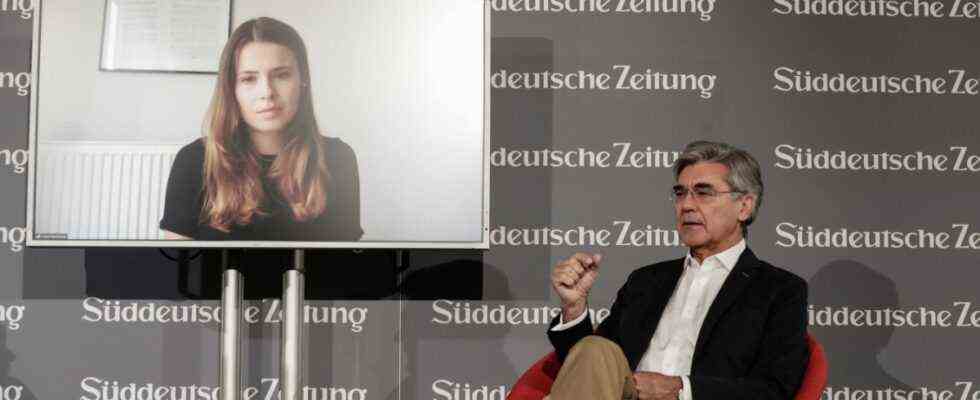The first question would be this: Can Joe Kaeser and Luisa Neubauer, the long-time Siemens boss and the young climate activist, actually get together? One of them was born in 1957 in Arnbruck, Lower Bavaria, and for years led one of the largest corporations in Europe. An industrial colossus that not only sells medical technology to hospitals and ICEs to the railways, but of course has also delivered one or the other gas turbine and has been busy building coal-fired power plants for years. The other, born in Hamburg in 1996, is a close companion of Greta Thunberg, co-initiator of the school strike movement Fridays for Future and calls for a coal phase-out by 2030 and strict compliance with the Paris Climate Agreement.
Is there a basis for discussion? “I think so,” says Kaeser. “Because the goal is the same. The way there must actually be the same.” Should, of course, but it’s not that easy with the path.
Kaeser, who is now the chairman of the supervisory board of the outsourced energy technology group Siemens Energy, is very familiar with X-ray machines and computer tomographs, and that’s why he likes these analogies to medicine. Climate protectors are strong at making diagnoses, but: “No one gets well with a diagnosis.” Anyone could sign the diagnosis, and prevention has been missed in the past few decades anyway. The real question is now: “What is the therapy?”
But is it really the case that everyone has already understood the diagnosis? You can’t be so sure that everyone really understands the problem, says Neubauer. Why else would a “mega-pipeline through the Baltic Sea” be built with Nord Stream-2 to transport Russian natural gas from Arctic fields to Central Europe? And Siemens, too, is “completely free not to build any new gas-fired power plants.” So it’s not that simple. But at least she is happy that they “got to the part of the conflict” so quickly.
Otherwise it would be boring.
After all, this is Kaeser and Neubauer discuss climate changeOne round of experimentation, and the experimental arrangement looks like this: Kaeser is sitting on the stage in Munich, beige trousers, white shirt, blue jacket, and overall more leisure time outing than Business dress. Luisa Neubauer is sitting in front of a light wall with heating in Berlin. At the start she says: “Good afternoon, hello.” Is this actually your first long public conversation? Kaeser says: “That could be”.
The fact that the long-time Siemens boss, with a chauffeur and a million-dollar salary, and the young climate activist, are on friendly terms in these 45 minutes could well be interpreted as an indication of closeness. However, the two of them have very different terms. He says: “You just said”, and she says “You emphasize that”. But he often calls her Luisa, he says “Luisa and Fridays for Future”, not “Frau Neubauer and Fridays for Future”. She, on the other hand, refrains from calling him Joe all the time. Hey joe No, it doesn’t go that far between the 64-year-old Kaeser and the 25-year-old Neubauer.
In the end, they are perhaps too far away for that, the clearly arguing climate activist Neubauer and the rhetorically very active Kaeser. “In essence, it has not yet been understood where we are,” he says. The fight against climate change, the restructuring of industry, the many jobs. “It is important that social peace is not endangered.” What about pensions, the welfare state, social peace? Market economy on the one hand, climate protection on the other? If there is one thing that Neubauer does not want to allow here today, it is to open up a contrast between young and old, climate protection and prosperity. “The climate crisis” especially affects “the weak,” she says. And “that concerns my grandmother and her friends.” Climate change affects everyone, and of course Kaeser finds it difficult to disagree.
You have to know how and when the two got to know each other better. That was in early 2020 when Fridays for Future protested against a Siemens contract to build a large coal mine in Australia. The deal wasn’t about the dirty coal itself, but it was about the delivery of signaling systems for trains that move the coal away from the mine. Kaeser then offered Neubauer a seat on a supervisory body of the Siemens energy subsidiary, but it turned down. “Luisa couldn’t,” says Kaeser today, understandingly. You could not be a climate activist and “part of the system.”
Part of the system? Now the old manager sounds almost like a critic of the system of which he was part for the past four decades, but maybe that’s the trick. At some point Neubauer speaks of the images from the flood areas of the last few days, of the Laschets and Söders wading through destroyed streets in high rubber boots. “They’re all people who have government responsibility,” she says. It is “cynical”. Kaeser wouldn’t be Kaeser if he didn’t gratefully take up the matter and continue filming: It’s a shame that no politician is on stage at the moment. What he is trying to say is: the politicians should be asked about their responsibilities.
In turn, Neubauer finds it difficult to disagree, and the way he sees Australia’s image disaster today goes very well with all of this. “We should never have done the project,” he says. 18 million Australian dollars – of course, this senseless PR disaster was not worth it. “We tried everything, and Luisa knows it, to get out of there,” says Kaeser. But one was just contractually obliged, billions in lawsuits threatened. Okay, then maybe rather stress with Luisa Neubauer and Fridays for Future. “It is a tried and tested means to talk to one another and not about one another,” says Kaeser at the beginning of the group. And that’s something.

